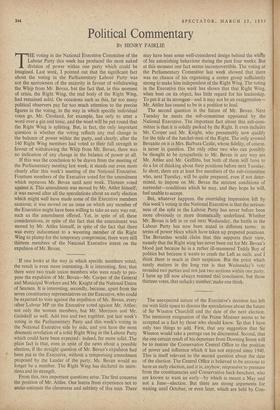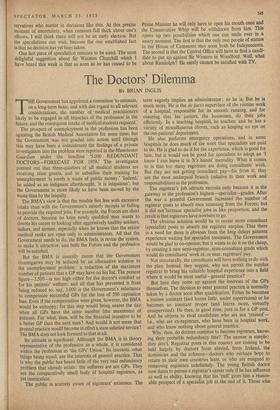Political Commentary
BY HENRY FAIRLIE THE voting in the National'Executive Committee of the Labour Party this week has produced the most naked division of power within one party which could be imagined. Last week, I pointed out that the significant fact about the voting in the Parliamentary Labour Party was not the narrowness of the majority in favour of withdrawing the Whip from Mr. Bevan, but the fact that, in this moment of crisis, the Right Wing, the real body of the Right Wing, had remained solid. On occasions such as this, far too many political observers pay far too much attention to the precise figures in the voting, to the way in which specific individual votes go. Mr. Crosland, for example, has only to utter a word over a gin and tonic, and the word will be put round that the Right Wing is splitting. But, in fact, the only important question is whether the voting reflects any real change in the balance of power within the party, and clearly, after the 140 Right Wing members had voted to their full strength in favour of withdrawing the Whip from Mr. Bevan, there was no indication of any change in the balance of power at all.
If this was the conclusion to be drawn from the meeting of the Parliamentary meeting last .week, it stands out even more clearly after this week's meeting of the National Executive. Fourteen members of the Executive voted for the amendment which reprieves Mr. Bevan until next week. Thirteen voted against it. This amendment was moved by Mr. Attlee himself; it was moved after all the speculations about an early election which might well have made some of the Executive members caution's; it was moved on an issue on which any member of the Executive might have been willing to take an easy way out, such as the amendment offered. Yet, in spite of all these considerations, in spite of the fact that the amendment was moved by Mr. Attlee himself, in spite of the fact that there was every inducement to a wavering member of the Right Wing to plump for the temporary compromise, there were still thirteen members of the National Executive intent on the expulsion of Mr. Bevan.
If one looks at the way in which specific members voted, the result is even more interesting.- It is interesting, first, that there were two trade union members who were ready to pro- pose the expulsion of Mr. Bevan—Mr. Cooper of the General and Municipal Workers and Mr. Knight of the National Union of Seamen. It is interesting, secondly, because, apart from the seven constituency representatives on the Executive, who could be expected to vote against the expulsion of Mr. Bevan, every other Labour MP on the Executive voted against Mr. Attlee; not only the women members, but Mr. Morrison and Mr. Gaitskell as well. Add two and two together, put last week's voting in the Parliamentary Party and this week's voting in the National Executive side by side, and you have the most dramatic revelation of a solid Right Wing in the Labour Party which could have been expected : indeed, far more solid. .The plain fact is that, even in spite of the news about a possible election, if the straight question of Mr. Bevan's expulsion had been put to the Executive, without a temporising amendment proposed by the Leader of the party, Mr. Bevan would no longer be a member. The Right Wing has declared its inten- tions and its strength.
From this, two important questions arise. The first concerns the position of Mr. Attlee. One learns from experience not to under-estimate the cleverness and subtlety of this man. There may have been some well-considered design behind the whOle of his astonishing behaviour during the past four weeks. But at this moment one fact seems incontrovertible. The voting at the Parliamentary Committee last week showed that there was no chance of his organising a centre group sufficiently strong to make him independent of the Right Wing. The voting in the Executive this week has shown that that Right Wing, when bent on its object, has little regard for his leadership. To put. it at its strongest—and it may not be an exaggeration— Mr. Attlee has ceased to be in a position to lead.
The second question is the future of Mr. Bevan. Next Tuesday he meets the sub-committee appointed by the National Executive. The important fact about this sub-com- mittee is that it is solidly packed by the Right. It even includes Mr. Cooper and Mr. Knight, who presumably now qualify for the title of the hatchet-men of the Right. The only avowed Bevanite on it is Mrs. Barbara Castle, whose fidelity, of course. is never in question. The only other two who can possibly be thought to be sympathetic to Mr. &van in any way arc Mr. Attlee and Mr. Griffiths, but both of them will have to do a lot of thinking about their positions before next Tuesday. In short, there are at least five members of the sub-committee who, next Tuesday, will be quite prepared, even if not deter- mined, to impose on Mr. Bevan the strictest conditions of surrender—conditions which he may, and they hope he will, feel unable to accept.
But, whatever happens, the overriding impression left by this week's voting in the National Executive is that the serious- ness of the split in the Labour Party has never before been more obviously or more dramatically underlined. Whether Mr. Bevan is left in or out next Wednesday, the battle in the Labour Party has now been stated in different terms: in terms of power blocs which have taken up prepared positions. The Bevanites would claim that this supports their view, namely that the Right wing has never been out for Mr. Bevan's blood just because he is a rather ill-mannered Teddy Boy of politics but because it wants to crush the Left as such; and I think there is much in their suspicion. But the point which surely matters in the long run is that Wednesday's vote revealed two parties and not just two sections within one party. I have up till now always resisted this–conclusion, but those thirteen votes, that unlucky number;make one think.
The unexpected nature of the Executive's decision has left me with little space to discuss the speculations about the future of Sir Winston Churchill and the date of the next election. The imminent resignation of the Prime Minister seems to be accepted as a fact by those who should know. Tko that I have only two things to add. First, that any suggestion that Sir Winston would take a peerage can be discounted. Second, that the one certain result of his departure from Downing Street will be to restore the Conservative Central Office to the position of power and influence which it has not enjoyed since 1940. This is itself relevant to the second question about the date of the election. The Central Office is believed to be anxious to have an early election, and it is, anyhow, responsive to pressure from the constituencies and Conservative back-benchers, who are known to want an early—by which is meant a May and not a June—election. But there are strong arguments for waiting until October, or even later, which are held by Con- seiyatives who matter in decisions like this. At this precise moment of uncertainty, when rumours fall thick about one's elbows, I still think there will not be an early election. But the speculations can wait, because the one established fact is that no decision has yet been taken.
One last piece of speculation remains to be aired. The most delightful suggestion about Sir Winston Churchill which I have heard this week is that as soon as he has ceased to be Prime Minister he will only have to open his mouth once and the Conservative Whip will be withdrawn from him. This opens up two possibilities which one can smile over in a weary moment. The first is that the only two people of stature in the House of Commons may soon both be Independents. The second is that the Central Office will have to find a candi- date to put up against Sir Winston in Woodford. Well, what about Randolph? He surely clinnot be satisfied with TV.



































 Previous page
Previous page